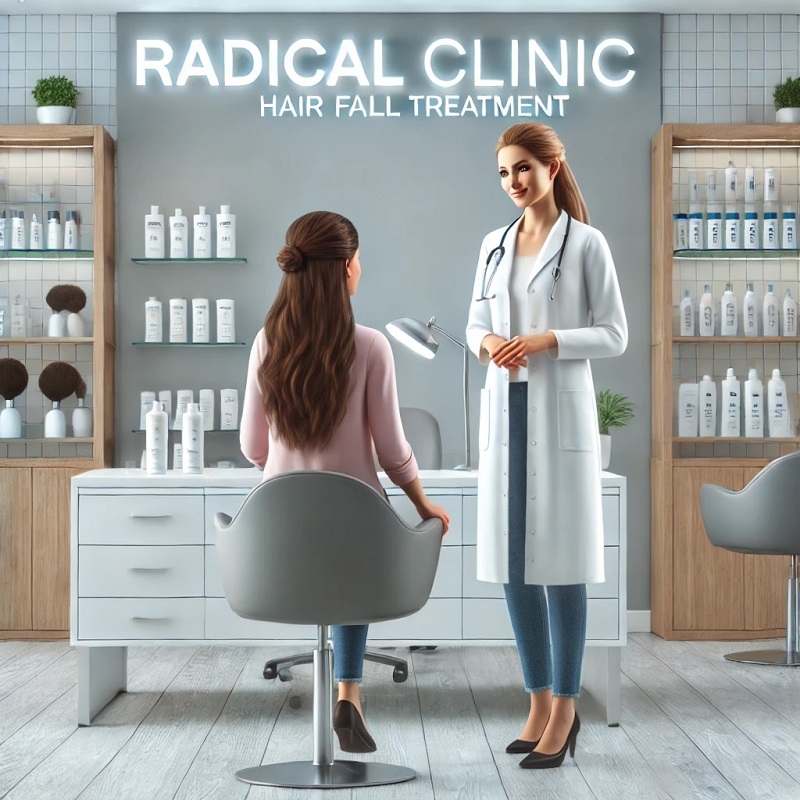Why Does Hair Fall Occur?
Hair fall is a common concern affecting people of all ages. While losing a few strands daily is normal, excessive shedding can be alarming. Understanding the root causes of hair fall can help in choosing the right treatment and preventive measures.
Common Causes of Hair Fall
1. Genetic Factors
If hair loss runs in your family, you may be genetically predisposed to androgenetic alopecia, also known as hereditary hair thinning. This condition causes gradual hair loss over time, mainly affecting the scalp’s crown and hairline.
2. Hormonal Changes
Hormones significantly impact hair growth. Imbalances caused by
thyroid disorders, PCOS, pregnancy, or menopause can lead to excessive hair shedding. Increased levels of
DHT (dihydrotestosterone) weaken hair follicles, making them shrink and fall out faster.
3. Nutritional Deficiencies
A diet lacking essential nutrients like
iron, biotin, zinc, vitamin D, and protein can weaken hair strands. Since hair is primarily made of keratin (a protein), insufficient protein intake can cause hair breakage and slow growth.
4. Stress and Lifestyle Habits
Emotional or physical stress can trigger
telogen effluvium, a temporary hair loss condition where hair prematurely enters the shedding phase. Poor sleep, excessive smoking, and an unhealthy lifestyle further contribute to weak hair follicles.
5. Overuse of Hair Products and Styling Tools
Frequent use of
harsh shampoos, chemical treatments, excessive heat styling, and tight hairstyles can weaken hair strands, leading to thinning and breakage.
6. Medical Conditions and Medications
Underlying medical conditions like
alopecia areata, lupus, scalp infections, or autoimmune diseases can lead to hair loss. Certain medications, including
chemotherapy, blood thinners, and antidepressants, also have hair loss as a side effect.
7. Environmental Factors
Exposure to
pollution, hard water, UV rays, and dust can damage hair follicles, causing dryness, brittleness, and increased hair fall.
When to See a Dermatologist?
While mild hair fall is common, consult a
dermatologist if you experience:
- Sudden or excessive hair shedding.
- Bald patches or visible thinning.
- Scalp irritation, redness, or flaking.
- Hair failing to regrow after falling out.
- Hair loss due to an illness or medication.
A dermatologist can identify the root cause and recommend personalized treatments.
How to Take Care of Your Hair?
- Maintain a balanced diet with essential vitamins and proteins.
- Reduce stress with meditation, yoga, or regular exercise.
- Use mild, sulfate-free shampoos and avoid excessive heat styling.
- Avoid tight hairstyles and harsh chemical treatments.
- Massage your scalp to improve blood circulation and hair growth.
- Seek professional advice from a dermatologist for effective solutions.
Types of Hair Fall Treatments Provided by Dermatologists
Dermatologists offer a range of advanced treatments for hair loss, including:
- PRP Therapy (Platelet-Rich Plasma): Uses your own blood platelets to stimulate hair regrowth.
- Mesotherapy: Involves injecting vitamins and nutrients into the scalp to nourish hair follicles.
- Hair Transplantation: A permanent solution for baldness by transplanting healthy hair follicles.
- Low-Level Laser Therapy (LLLT): A painless laser treatment that enhances hair growth.
- Medications (Minoxidil & Finasteride): FDA-approved treatments for reducing hair fall and promoting regrowth.
- Scalp Micropigmentation: A cosmetic procedure that gives the illusion of fuller hair.
Best Dermatologist for Hair Fall Treatment in Faridabad
If you’re struggling with hair loss, seeking expert advice is crucial.
Dr. Radhika Raheja at
Radical Clinic, Faridabad, is a renowned dermatologist specializing in
PRP therapy, mesotherapy, hair transplants, and advanced hair restoration treatments. Her expertise ensures
safe and effective solutions for all types of hair loss problems.
For professional hair care solutions, visit
Radical Clinic today and take the first step towards healthier, fuller hair!

